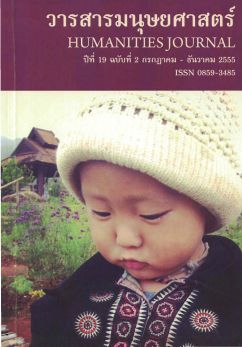วาทกรรมว่าด้วยชนบทในวรรณกรรมของไม้ เมืองเดิม
Main Article Content
Abstract
วรรณกรรมของไม้ เมืองเดิมได้เสนอภาพชนบทในช่วงสมัยก่อนสงครามโลกครั้งที่ 2 ชนบทของไม้ เมืองเดิมเป็นพื้นที่ทางวัฒนธรรมที่ห่างไกลความเจริญ ตัดขาดจากโลกภายนอก สุขสงบ ความขัดแย้งในเรื่องจึงเป็นความสัมพันธ์ของคนในชุมชนที่แก้ไขด้วยวิถีชาวบ้าน ไม่ว่าจะเป็นการจัดการกับความขัดแย้งด้วยการประนีประนอมหรือด้วยกำลังของตนเองโดยที่รัฐมีบทบาทเข้าไปจัดการปัญหาน้อยมาก ในสังคมไม่มีความแตกต่างระหว่างชนชั้นมากนักเนื่องจากทุกคนเป็นชาวไร่ชาวนา ทำให้คนในชุมชนสามารถรักษาอิสระและศักดิ์ศรีได้ ในกรอบวาทกรรมวิเคราะห์พบว่างานของเขาไม่ได้เสนอภากที่เป็นจริง แต่เป็นการคัดสรรเพื่อเสนอภาพชนบทชุดหนึ่งที่เป็นชุมชนอุดมคติที่ให้คุณค่าแก่ศักดิ์ศรีและความกล้าหาญมากกว่ากฎเกณฑ์ทางจริยธณรมหรือกฎหมาย ไม่ปรากฏความสัมพันธ์ทางเศรษฐกิจและสังคมที่ซับซ้อน และงานเน้นคุณค่าของชนบทเหนือเมือง ดังนั้น งานเขียนของไม้ เมืองเดิมจึงได้ทำให้เกิดการตระหนักถึงคุณค่าของวิถีชีวิตชนบทในช่วงที่ความเจริญของยุคสมัยใหม่กำลังรุกคืบเข้ามาในชนบท
Rural Discourses in Mai Muangderm’s Literary Works
Soranat Tailanga
Mai Muangderm’s literary works present the rural in the time before the World War II. His representation of the rural is cultural space which is remote and peaceful. The conflicts in the works are the relationship of the villagers which can be solved by compromise or by force with less involvement from governmental administration. His works shows no class difference conflicts since all is farmers; thus the maintenance of one’s free will and integrity. The discourse analysis framework points out that his works does not represent the ‘real’ rural areas; instead, they are the selection of particular images to present the rural as the ideal community which gives value to integrity and courage more than ethics and legality. The complicated problems of economic and social relations are left out. The works emphasizes on the value of the rural over the urban. As the result, Mai Muangderm’s works revolve around the realization of the value of folk ways as modernization invades the rural.


